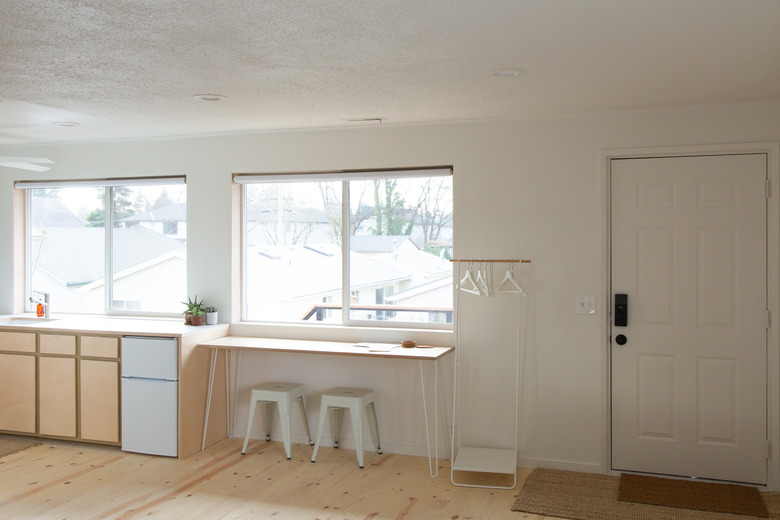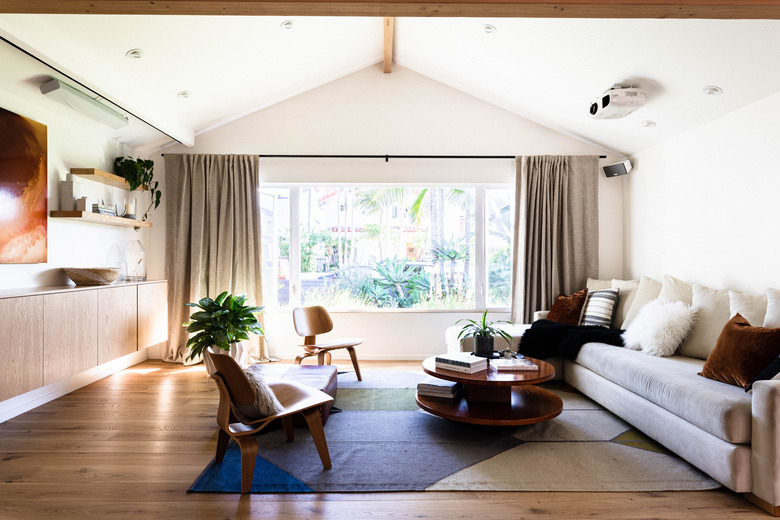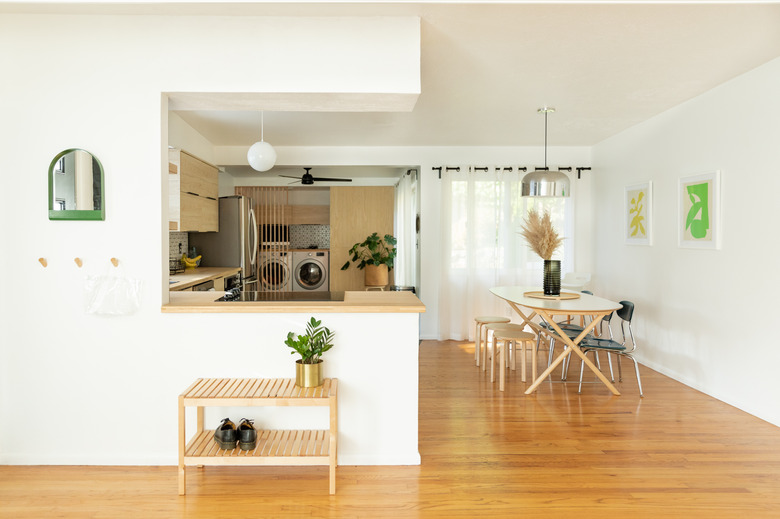How Much Does Bamboo Flooring Cost?
Bamboo flooring can look like hardwood from a distance, but there are differences in its manufacturing, durability and overall life span. Homeowners may choose bamboo because it is an elegant addition to any home, can last years with proper care and maintenance and is more water-resistant than hardwood. In terms of materials and installation, the cost of bamboo flooring is equivalent to some hardwood flooring species but is also lower than many others.
Bamboo grows quickly. It matures within five years and can reach heights of 100 feet. Because of its ability for fast growth and self-regeneration, bamboo is a popular, eco-friendly alternative to hardwood.
Tip
The cost of bamboo flooring materials is equivalent to or less than hardwood depending on the species. The condition of your current floor and other various installation factors will add to the cost.
Types of Bamboo Flooring
Types of Bamboo Flooring
Bamboo is a tall grass that is native to warmer climates, but the species used in flooring materials comes mainly from China. To create bamboo flooring, manufacturers strip the plants of their outer green layer to reveal a soft, golden inner layer while leaving its root intact for regrowth.
Harvesters cut the plants into thin, flat strips or shred them into strands and boil or steam the pieces before drying them thoroughly. With these pieces, they create engineered planks in which the top layer is bamboo with inner layers of plywood, or one of three types of solid planks:
- Vertical: Layered and bonded strips of bamboo that lay with their edges facing up
- Horizontal or flat grain: Layered and bonded strips of bamboo laying edge to edge; the nodes or "knuckles" of the stalk are most apparent in this grain.
- Strand woven: Heat-compressed fibers forming tightly interwoven strands that are stronger than vertical or horizontal bamboo planks and most hardwoods.
The Price of Bamboo Flooring Materials
The Price of Bamboo Flooring Materials
The cost of bamboo planks ranges from $3 to $12 per square foot. Strand-woven bamboo is more expensive than horizontal or vertical planks, with flat grain the cheapest of the three. By comparison, solid red-oak planks are about $3 to $6, and more exotic hardwoods, like tigerwood, are $8 to $14. The price of engineered planks varies according to thickness, with bamboo ranging from $3 to $10 and hardwood from $3 to $13 depending on the species.
Color can also affect the price. Light or natural bamboo is less expensive than carbonized planks, in which high heat and pressure give the material a deep-brown hue. A specific stain or finish can also increase the cost. As an example, the following finishes differ in both appearance and price per square foot:
- Distressed: Rustic wire-brushed planks, $5 to $7
- Matte lacquered: Anti-slip planks with no shine, $3 to $5
- Satin matte: Planks with a slight, light sheen, $3 to $5
Design also factors into the cost of materials, with glue or nail-down bamboo planks more expensive than floating boards, in which the individual pieces attach to one another but remain unsecured to the subfloor. Brands known for high-quality materials and harvesting practices will also be more expensive than those whose product origins are unknown, as they ensure the materials are sustainable and safe.
Popular manufacturers Teragren and Eco Fusion are at the higher end of the price spectrum per square foot at $5 to $7 for vertical planks, while Ambient BP and Trinity Bamboo are at the lower end at $3 to $5.
Bamboo Flooring Cost of Installation
Bamboo Flooring Cost of Installation
Installation costs also vary widely from $5 to $10 per square foot. This is due to a few different factors:
- A DIY installation project will be cheaper than if you were to hire a professional.
- Old floor removal can add $6 to $8 per square foot in labor costs. This is something you can do yourself to save money. However, according to the Environmental Protection Agency, if your current floor dates back to the mid 1980s or earlier, it may contain asbestos. You can send a sample of the material to an accredited lab for testing, which will cost around $200. If your floor has asbestos, an abatement company can remove it, or you can leave it in place and cover it with floating planks.
- Bamboo thresholds are $1 to $5 each, and baseboards are $1 to $2 per linear foot.
- You may need to purchase installation supplies, such as adhesives, sealants, fasteners or any other special equipment suggested by the manufacturer.
- You may wish to insulate underlayment with vapor barriers or foam underlays to prevent any moisture from getting in and any possible toxic fumes from getting out. This costs about $20 per square foot.
- Labor prices will vary from location to location. Depending on where you live, the cost for flooring contractors can be significantly different. Local building codes can also affect your installation budget.
- Materials can also include delivery charges.
The Pros and Cons of Bamboo Flooring
The Pros and Cons of Bamboo Flooring
While bamboo is a popular alternative to hardwood flooring, there are both benefits and drawbacks to it.
The pros:
- Bamboo is sustainable. It is more eco-friendly than hardwood, as it is self-regulating and matures in a quarter of the time that a tree does.
- It is surprisingly strong. Strand-woven bamboo is one of the hardest materials on the market and surpasses most hardwood species.
- Bamboo is versatile. It can go over any subfloor in almost any room you choose. It is also dimensionally stable, which means it doesn't expand or contract as widely in temperature and humidity extremes as hardwood flooring does.
- With routine maintenance, bamboo is hygienic and low in allergens. Routine upkeep requires sweeping or light mopping.
The cons:
- While bamboo is water-resistant, that doesn't mean it is waterproof. To keep it free of damage, do not install it in rooms with an excess of water and wipe spills quickly.
- Bamboo is still prone to dents or scratches. Use felt protector pads under furniture, do not wear heels or cleats and make sure to trim pets' nails to avoid damage.
- Unlike hardwood, which can last 75 years or more, bamboo has a 20- to 30-year life span.
References
- The Bamboo Flooring Company: How Is Bamboo Flooring Manufactured?
- Fixr: Bamboo Flooring Installation Cost
- The Bamboo Flooring Company: Advantages and Disadvantages of Bamboo Flooring
- Environmental Protection Agency: How EPA's Asbestos Regulations Apply to Floor Tiles and Mastic
- Google Books: Farming Bamboo
- Environmental Protection Agency: How Do I Know if I Have Asbestos in My Home (in Floor Tile, Ceiling Tile, Shingles, Siding, etc.)?


